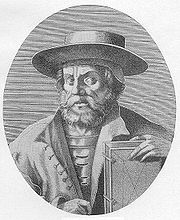- Emmanuel Chrysoloras
-
Manuel Chrysoloras oder Emmanuel Chrysoloras (* 1353 vermutlich in Konstantinopel; † 1415 in Konstanz) war ein byzantinischer Diplomat und Förderer der griechischen Literatur in Westeuropa.
1393 sandte der byzantinische Kaiser Manuel II. Palaiologos Chrysoloras in diplomatischer Mission nach Westeuropa. Politisch wurde dem Kaiser dieser Schritt notwendig, weil die Bedrohung durch die Türken die weitere Existenz des Reiches ernsthaft infrage stellte. Die diplomatische Mission bestand in Geldsammlungen und in der Suche nach möglichen Bündnispartnern im Falle bewaffneter Auseinandersetzungen.
Chrysoloras ließ sich in Italien nieder. Mit seinen Erotemata sive Quaestiones (gedruckt 1496) schuf er die erste griechische Grammatik. Zu seinen Schülern zählten unter anderem Giannozzo Manetti, Francesco Filelfo, Giovanni Aurispa, Ambrogio Traversari und Guarino da Verona. Diese aus diplomatischen Missionen erwachsenen Kulturkontakte der Byzantiner mit dem lateinischen Europa fielen in eine Zeit, wo sich in Italien einige Kreise von Gelehrten und Künstlern zunehmend für die klassische Antike zu interessieren begannen. Diese Zeit wird nicht ohne Grund Renaissance-Humanismus genannt. Chrysoloras ist es wohl auch zu danken, dass man sich im lateinischen Westen wieder für das Griechisch interessierte. Er förderte den Aufbau griechischer Handschriftensammlungen in Italien. An diese Bemühungen wiederum nahm ein weiterer Schüler von ihm, Niccolo Niccoli, bedeutenden Anteil. Durch den Ankauf dieser Handschriften aus vornehmlich Konstantinopel war es letzten Endes möglich, dass diese durch Abschriften der Humanisten überliefert wurden. Chrysoloras hat auch bedeutenden Anteil der Herausbildung der Klassischen Philologie in dieser Zeit.
Chrysoloras war auch Abgesandter auf dem Konzil von Konstanz, auf dessen Beschluss hin Jan Hus verbrannt wurde. In Konstanz erinnert eine Grabplatte an Chrysoloras, der während des Konzils verstarb.
Literatur
- Émile Legrand: Notice biographique sur Manuel Chrysoloras. Maisonneuve & Larose, Paris 1963.
- Jacques-Paul Migne (Hrsg.): Manuelis Chrysolarae epistolae. Graece et Latine. Migne, Paris 1866.
Personendaten NAME Chrysoloras, Manuel KURZBESCHREIBUNG byzantinischer Gelehrter der Frührenaissance und Förderer der griechischen Literatur in Westeuropa GEBURTSDATUM 1353 GEBURTSORT unsicher: Konstantinopel STERBEDATUM 1415 STERBEORT Konstanz
Wikimedia Foundation.

